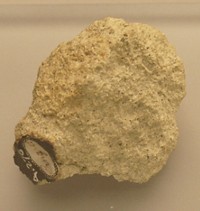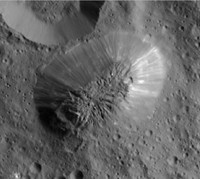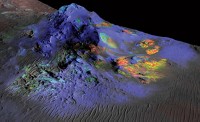Advertisement
Grab your lab coat. Let's get started
Welcome!
Welcome!
Create an account below to get 6 C&EN articles per month, receive newsletters and more - all free.
It seems this is your first time logging in online. Please enter the following information to continue.
As an ACS member you automatically get access to this site. All we need is few more details to create your reading experience.
Not you? Sign in with a different account.
Not you? Sign in with a different account.
ERROR 1
ERROR 1
ERROR 2
ERROR 2
ERROR 2
ERROR 2
ERROR 2
Password and Confirm password must match.
If you have an ACS member number, please enter it here so we can link this account to your membership. (optional)
ERROR 2
ACS values your privacy. By submitting your information, you are gaining access to C&EN and subscribing to our weekly newsletter. We use the information you provide to make your reading experience better, and we will never sell your data to third party members.
Physical Chemistry
Martian Meteorites Contain Abiotic Carbon
Volcanic processes created large carbon-based molecules in meteorites
by Elizabeth K. Wilson
May 28, 2012
| A version of this story appeared in
Volume 90, Issue 22
Although scientists have debated the possible biogenic origins of large organic molecules found in numerous martian meteorites, two new studies suggest that the molecules formed during volcanic processes. In the first study, Andrew Steele at Carnegie Institution for Science and colleagues examined 11 martian meteorites that had fallen to Earth, using confocal Raman imaging spectroscopy (Science, DOI: 10.1126/science.1220715). They found the large organic molecules encapsulated within tiny volcanic olivine and pyroxene crystals that formed as magma from martian volcanoes cooled. The second report, in press in American Mineralogist, focused on ALH84001, the famous martian meteorite that contained putative biogenic compounds within carbonate globules (DOI: 10.2138/am.2012.4148). Steele’s group detected graphite—a key indication of abiotic processes—in the globules. The results suggest, the authors say, that reduced organic carbon is nearly ubiquitous in martian basaltic rocks and that it formed via igneous, not biological, processes. The authors caution eager martian life seekers looking forward to results from the Mars Science Laboratory (MSL): “A positive detection of organics (especially polycyclic aromatic hydrocarbons) on Mars by MSL may be detecting this abiotic carbon reservoir.”





Join the conversation
Contact the reporter
Submit a Letter to the Editor for publication
Engage with us on Twitter